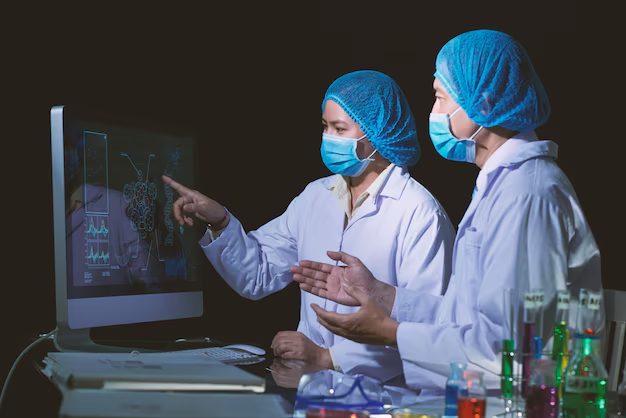Medical technology has seen rapid advancements over the past few decades, and these innovations continue to revolutionize healthcare. From improving diagnostics to enhancing treatment options, technology plays an essential role in improving patient outcomes, making healthcare more accessible, and optimizing medical procedures. In this article, we will explore some of the latest innovations in medical technology and their impact on the healthcare industry.
1. Artificial Intelligence (AI) and Machine Learning
Artificial intelligence (AI) and machine learning (ML) are transforming medical practice by offering advanced tools for diagnosis, treatment planning, and personalized care. AI-powered systems can analyze vast amounts of medical data, including medical images and patient records, to detect diseases such as cancer, heart conditions, and neurological disorders at an early stage. For example, AI algorithms are being used in radiology to detect abnormalities in X-rays and MRIs, often with higher accuracy than human radiologists. These technologies are also enhancing robotic surgeries and improving drug development.
2. Telemedicine and Virtual Healthcare
The COVID-19 pandemic accelerated the adoption of telemedicine, allowing patients to receive healthcare remotely. Virtual consultations, remote monitoring, and telehealth services have become vital in managing chronic conditions and providing timely care. Telemedicine platforms use video conferencing, smartphone apps, and wearables to connect patients with healthcare professionals. These innovations reduce the need for in-person visits, making healthcare more convenient, especially for people in rural or underserved areas. As technology continues to evolve, telemedicine is expected to expand its capabilities, offering more interactive and personalized experiences.
3. Wearable Health Devices

Wearable health technology is another innovation that is rapidly gaining popularity. Devices like smartwatches and fitness trackers are now capable of monitoring a wide range of vital health metrics, including heart rate, blood pressure, oxygen levels, sleep patterns, and physical activity. These devices can provide real-time data to both patients and healthcare providers, helping to manage chronic conditions like diabetes, cardiovascular disease, and obesity. Some wearable devices also offer alerts for abnormal readings, enabling prompt medical attention and improving overall health management.
4. Robotic Surgery and Minimally Invasive Procedures
Robotic surgery has been one of the most significant technological advancements in the medical field. Robotic systems, such as the da Vinci Surgical System, allow surgeons to perform complex procedures with greater precision, flexibility, and control. These systems enable minimally invasive surgeries, which result in smaller incisions, reduced blood loss, shorter recovery times, and less post-operative pain for patients. Robotic surgery is commonly used in procedures such as prostate surgeries, gynecological surgeries, and cardiac surgery. It is also being integrated into training programs to enhance surgical education.
5. 3D Printing in Medicine
3D printing, also known as additive manufacturing, has found applications in various aspects of medicine, including prosthetics, organ transplants, and surgical planning. The technology enables the creation of highly customized prosthetics, implants, and even anatomical models based on a patient’s specific anatomy. 3D-printed models can be used for preoperative planning, allowing surgeons to practice complex procedures before performing them on the patient. In the future, 3D printing could even be used to create functional human tissues and organs, potentially revolutionizing organ transplantation and regenerative medicine.
6. Gene Editing and CRISPR Technology
Gene editing technologies, particularly CRISPR-Cas9, are groundbreaking innovations that have the potential to cure genetic disorders and revolutionize personalized medicine. CRISPR allows scientists to make precise modifications to DNA, either by repairing mutations, inserting new genes, or silencing problematic genes. This technology holds promise for treating genetic diseases like sickle cell anemia, cystic fibrosis, and muscular dystrophy. As research advances, gene editing may play a pivotal role in preventing inherited conditions and improving patient outcomes.
7. Personalized Medicine and Pharmacogenomics
Personalized medicine is an approach that tailors medical treatment to the individual characteristics of each patient. One of the key tools in personalized medicine is pharmacogenomics, which studies how genes affect a person’s response to medications. By analyzing a patient’s genetic profile, healthcare providers can predict how they will respond to specific drugs, minimizing adverse effects and optimizing treatment efficacy. This technology is especially valuable in the treatment of cancer, where personalized therapies based on genetic mutations have shown promising results.
8. Nanotechnology in Medicine
Nanotechnology is another emerging field that is transforming medicine. It involves the manipulation of matter at the nanoscale (one billionth of a meter) to create devices and materials that can interact with biological systems at the cellular level. Nanotechnology is being used in drug delivery systems, where nanoparticles can be designed to deliver medication directly to the target site, reducing side effects and improving treatment efficiency. Additionally, nanotechnology has potential applications in diagnostics, cancer treatment, and tissue regeneration.
Conclusion
The latest innovations in medical technology are reshaping the healthcare landscape by improving diagnosis, treatment, and patient care. From AI-powered tools to wearable devices and gene editing, these advancements are enabling more accurate, personalized, and efficient healthcare. As technology continues to evolve, we can expect even more breakthroughs that will further enhance the quality of care and improve health outcomes for individuals worldwide.
FAQs
Q. How is AI being used in healthcare?
AI is used in healthcare for diagnosing diseases, analyzing medical images, developing personalized treatment plans, and enhancing robotic surgeries.
Q. What are the advantages of telemedicine?
Telemedicine offers convenience, accessibility, and timely care, particularly for patients in remote or underserved areas. It also reduces the need for in-person visits, making healthcare more efficient.
Q. How do wearable devices improve health management?
Wearable devices monitor vital health metrics, track physical activity, and provide real-time data, helping patients and healthcare providers manage chronic conditions more effectively.
Q. What is the potential of gene editing in medicine?
Gene editing, especially CRISPR technology, has the potential to cure genetic diseases by precisely modifying DNA to repair mutations or prevent inherited conditions.
Q. How does 3D printing benefit medicine?
3D printing enables the creation of customized prosthetics, implants, and anatomical models, enhancing surgical planning and improving patient-specific treatments.

